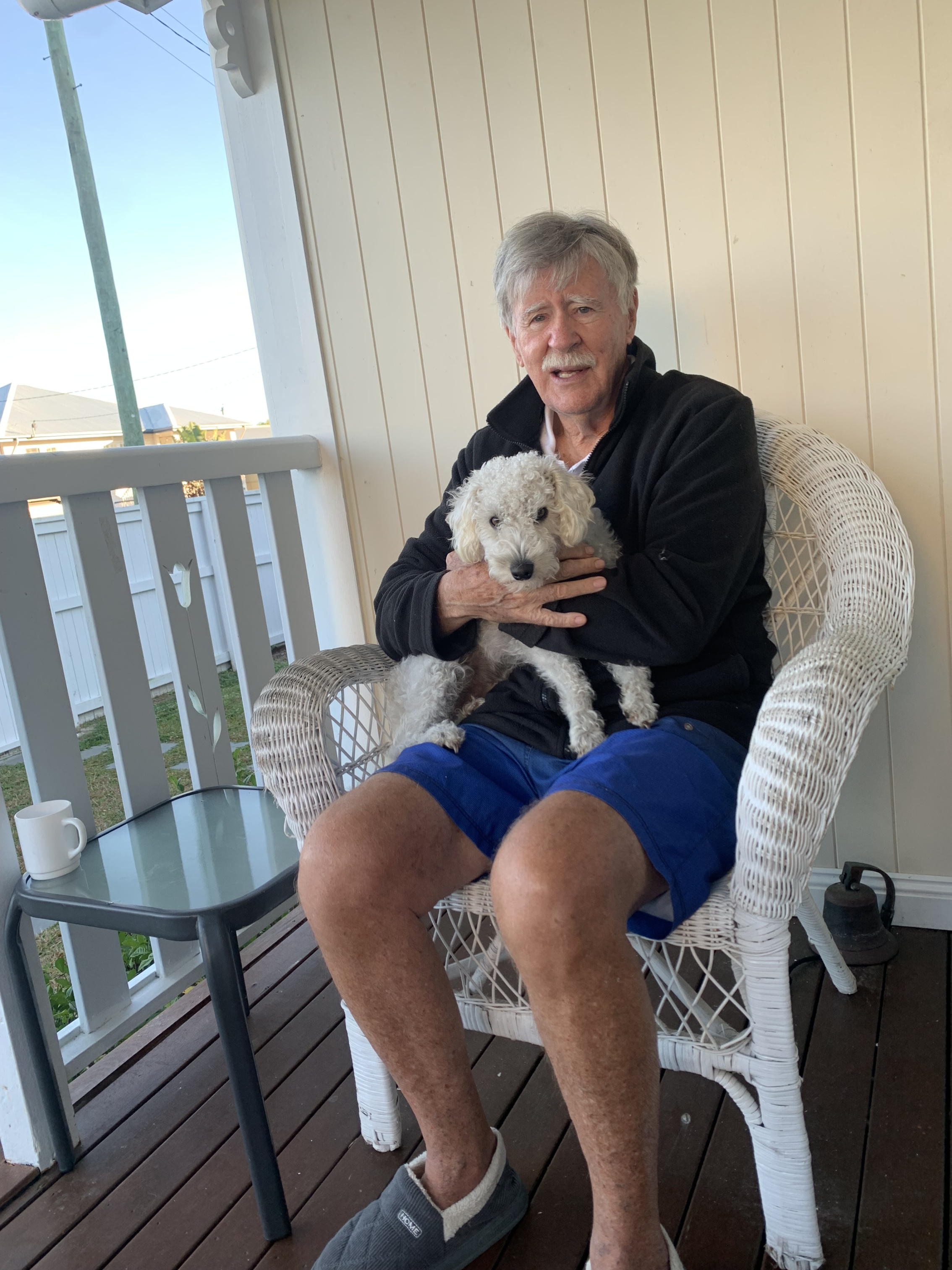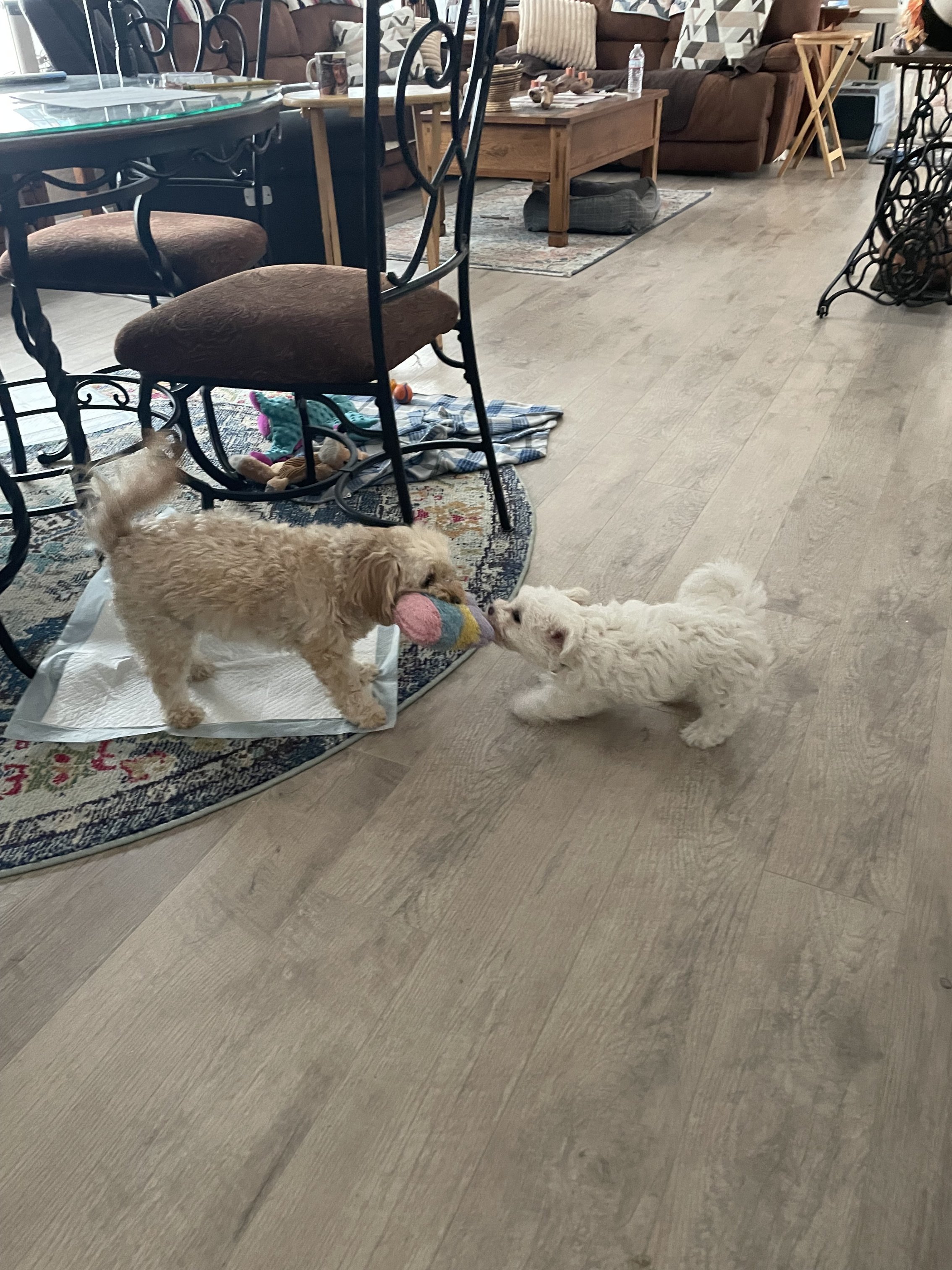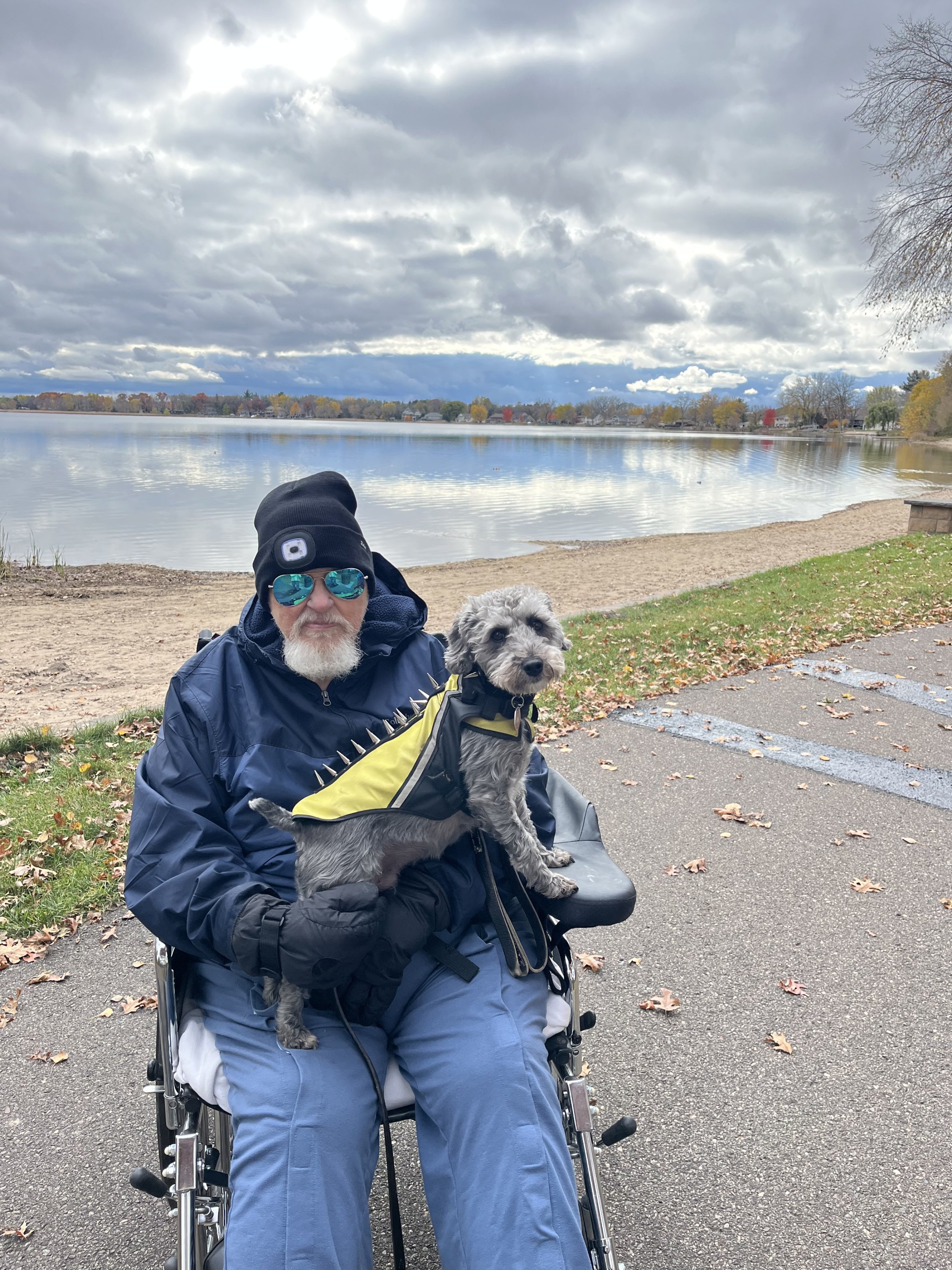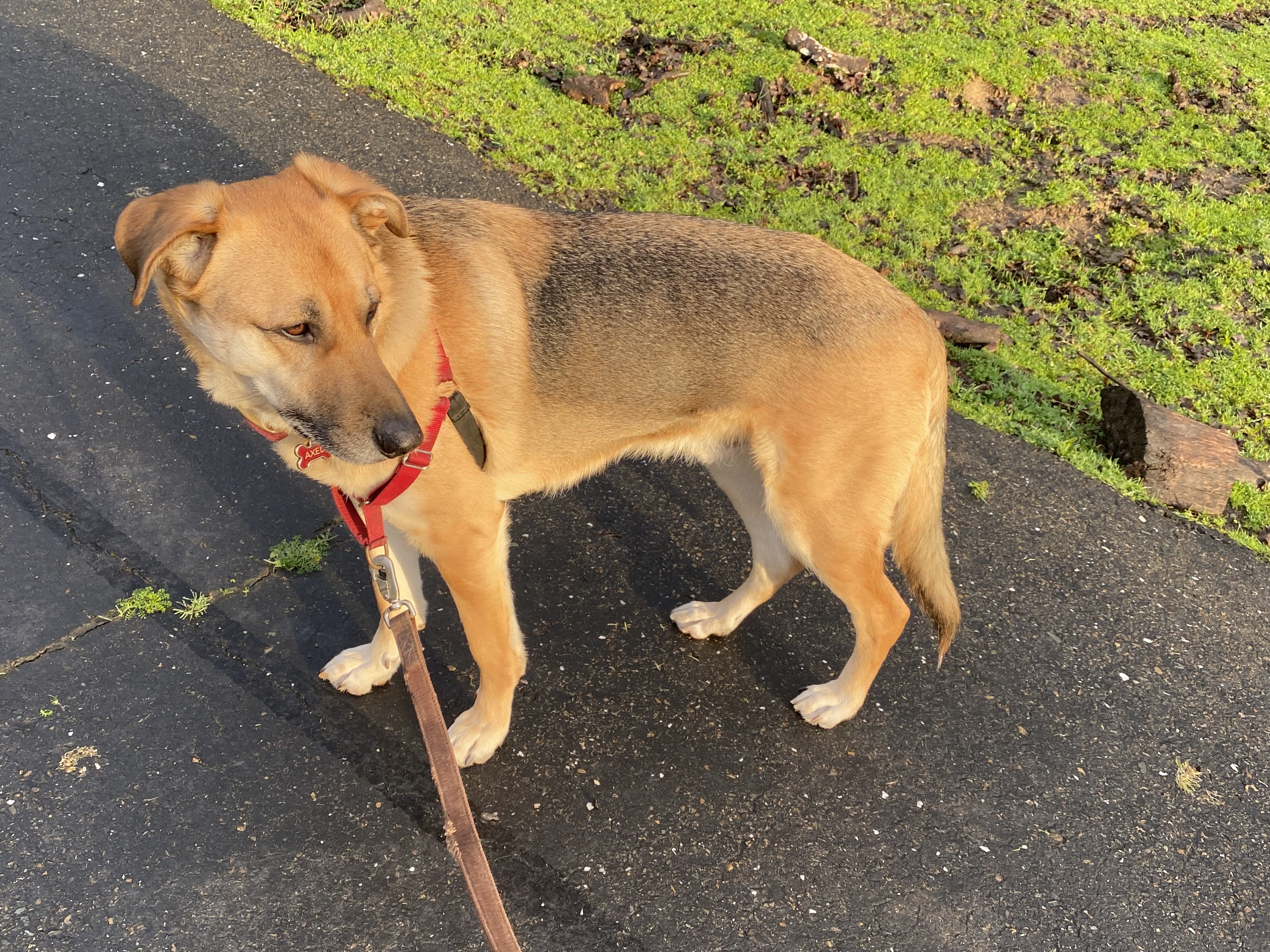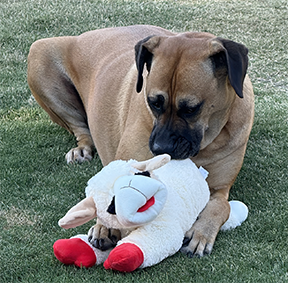Dogs and Alzheimer’s

my husband was diagnosed with MCI and now in stage 1 of Alzheimer’s
Does anyone have a recommendation about a puppy/dog for my DH? I am still working and he does not have many hobbies, I was hoping this would give him a companion and something to care for and keep him busy. He loves small dogs and we are considering but wanted to see what others think. Thanks!
Comments
-
0
-
Early in my DW’s journey, about the time she was first diagnosed we got a puppy (see my avatar). My DW had taken a strong interest in my daughter’s dog, a cockapoo, so we got one too. My DW certainly enjoyed the dog, but had no instinct to actually take care of him. At that time I also retired as my DW started needing 24/7 care, which meant I would be home to properly look after the pup.
So if you get a dog, even if you think your DH is in the early stages, you will probably need to be the primary doggie caregiver sooner than later. Puppies need to be housebroken by taking them outside at regular intervals, something a PWD may have trouble keeping track of. One former member of this site had quite a problem with her LO constantly over feeding their animals.
In our case we ended not neutering the dog because I tested the dog with the necessary “cone of shame” and my DW did not like it and it seemed like she was going to try to liberate the puppy from the cone at any opportunity. I suspected this would happen and that’s why I tested it before actually having the operation done.
But as I said she enjoyed the dog until she had to be placed in a MCF. Now the dog is my constant companion and certainly eases the loneliness that resulted.
5 -
Things to consider: Alzheimer’s can progress quickly or slowly. There is no way to predict how it will progress. It depends on the area of the brain affected. Progression can take 3-20 years. Caring for a pet requires the ability to know the time of day and to remember when the pet was last fed. Also the person needs to be able to take the pet outside or for walks and that is risky. Many pets become tripping hazards for people with Alzheimer’s. A pet may be a short term solution. You would need to take over caring for the pet, hire someone or give the pet to someone else. That could come sooner than later.
2 -
So similar for us with one exception, we got our puppy mainly for me. Our daughter found us an 8 week old Schnoodle fully house trained thankfully but we still had to go through the puppy stage of very sharp teeth, chewing everything and needing to be taken out during the night. We had many exhausting nights of all of us getting up to go at the same time then difficulty settling down again. We are both retired DH has aphasia and dementia I needed something extra to hold and love and I will be ever thankful for this. Milo is wonderful with my DH he has a “where’s Gary” command and he’s off like a jack rabbit to find my DH, brilliant. He’s also a registered Care Dog so we can take him anywhere, shops, doctors etc.
As Vitruvius says be prepared for all the caring feeding and exercising to fall on your shoulders, plus a puppy has an extraordinary requirement for exercise and this is a harder task than I thought.
Perhaps there might be a mature dog that requires a new home that way you can match personality with personality and do a home trial. They are so nonjudgmental you can talk to them, pet them, pour out your heart to them and cry and they are so loyal and understanding. Good luck.
3 -
ps thought you might like a smile we did have our puppy neutered but didn’t use the cone of shame (puppy kept slipping out of it) plus DH couldn’t cope with it so I used a couple of OOOO baby onesies with the top cut off. Worked a treat and neither puppy nor DH took any notice of it!! 🤣
10 -
Wow, a great question because many see a pet as a good action to help and for some it is, I am sure. In our case we had always had dogs and had one when my dear wife's process began to become more pronounced. She loved that dog so much but it quickly became clear that she was unable to care for it reliably. It sometimes would cause agitation for her if it begged for attention. As others have said, I became the primary caregiver for the dog as well as my dear wife. In short order I had to adopt out the dog and found that she had little memory of it and never felt the loss. Each case is truly different but just be prepared for unfortunate and sudden changes which can impact the pressures for you with a pet added to your responsibility.
3 -
Every case is different. My mom loved her dog, but fed it constantly til it was overweight + unhealthy. She also forgot about hygiene + would hold the dog while she ate + ended up with salmonella twice, which was a treat. She did not notice the dog’s cues any longer to go out + resented it when it ‘bothered’ her. We finally had to rehome it + surprisingly she took it pretty well when the dog was gone. I did get her an electronic cat that she enjoyed for some months.
1 -
Dogs are wonderful! But they need and deserve attentive care. A dog for you might be great, but a dog for your DH? If you get a dog, you will want to think of it right away as your dog. That’s only fair to the dog.
1 -
my LO is stage 4 of Alzheimer’s, we have two dogs, just lost one and got a puppy. He absolutely would be lost without them. For us our dogs are our greatest support! I’m a big yes🐶
2 -
My DW is now in stage 5 of EOAD. We’ve had our lab since before her diagnoses. I now have to keep an eye on her around the dog. She will feed the dog whatever she is eating that are possibly dangerous for the dog like chocolate, grapes etc. if we did not have a dog at the time okie dokie diagnoses 3 years ago, I personally would not get one. Everyone had to decide if it is a good idea or not.
0 -
My grandmother overfed the dog, but withheld water when unsupervised. She would not let him outside to empty his bladder/bowels, certain that “someone” was going to feed him poison. She also would “pet” the dog by strangling him(the dog was a Lhasa apso) and that is no exaggeration. These behaviors appeared after properly taking care of him for about 4 years.
Please think carefully about adding a pet to your household.
0 -
We have a Schnoodle too, adopted him in ‘21. He is a great companion for my DH, but the full responsibility falls on me and others who come in to care for DH. My DH can do nothing more than pet him and call him. One big problem is DH sharing meals with him - puppy goes in the kennel now during meals/snacks. They’re good for each other and I’m glad we got him before the full weight of dementia set in. Can’t imagine dealing with a puppy now.
3 -
Is it fair for the dog to be starting in a situation that , sadly , won't be improving . Young pups want to learn just like a child and if a PWD is inconsistent that can cause stress.
If the pet is there pre- Dx makes sense to try to keep as long as healthy and safe for both human and canine. Mistreatment can happen and the dog could be a stressor for the PWD as they muddle what the dog needs.
There are also Joy for all brand "toy" pets that can provide no-care comfort .
0 -
Hello gorgeous Schnoodle so nice to see and yes wonderful company only if it works.
1 -
This thread is so characteristic of this disease, no two loved ones experience it the same way. We all struggle to find anything that will make our loved one's miserable life better and a pet may be the right answer for some. As with EVERYTHING we all try, we have to go into it with minds open to failure, cause it sure does come often. So nice to see photos of loved ones with their pets. I wish my dear wife had been able to enjoy her dog as a help for her because she loved that dog so much but, alas, it was not to be. We never give up trying to find some small pleasure for our loved one because there is so little for them. That is why this group is so special, you never give up and your loved ones are so much the better for each of you.
7 -
My Mom (stage 6c) and Sandy the Golden Retriever are best buddies. The dog is good for her mentally as she deteriorates. Sandy has sometimes knocked over Mom showing too much love. Mom tries to scold the dog as if she were reverting to raising us kids again.
1 -
My husband is solid stage 4, still ambulatory although not as stable as before ALZ. I have a 4 year old 100 # German Shepherd/Great Pyrenees mix. Were it not for the dog’s training it would be a train wreck for my husband to walk him on our rural acreage. The dog is trained not to jump up on people or to pull on the leash. At stairs he pauses to avoid ascending or descending too quickly.
I believe a solid training foundation is what works for us. Plus, it’s more fair for the dog. At my husband’s stage I wouldn’t get a puppy.
Axel5 -
Pets are a huge YES, as long as you understand that you will be the caretaker for the puppy. Our cat looks after my wife as much as I do (LOL), and she will meow loudly if I my wife needs my attention.
I am a huge advocate for music and pets. I even have an aquarium filled with decorative tetras (small fresh water tropical fish). My dear wife loves the aquarium, and I even enjoy cleaning it (therapeutic). Pets are wonderful for you as a caregiver, and they can keep your loved one company while you putter around the house and get things done.
1 -
love this photo
0 -
My question would be why a puppy? We have an 11 year old shepherd that has always been more my husbands. We love her dearly, but he’s become clueless about caring for her. Last January a friend who had just been diagnosed with dementia asked if I would take her two year old shepherd. I knew I could not handle a puppy, so had been looking for an older companion dog. Well, I couldn’t say no and I just absolutely love her. She’s my companion and like Biggles, something to cuddle with. My husband enjoys her as well, and has always been an animal lover. Now he’s getting more and more detached and cannot comprehend my attachment. So please think hard about getting a puppy. They take a lot of work and it wouldn’t be fair to the dog if it doesn’t get proper care and exercise.
3 -
Lots of interesting and different experiences, which is why this site is so helpful. We have 2 teddy bears that we have had 11 years. DW is in stage 5/6 and loves them dearly (more than me?) but can no longer feed them on her own and certainly could not walk them. But they are great companions hanging around with her. But having said that, I think a puppy could be a disaster for everyone, especially if you are working. Likely stressful for you and the dog, maybe too much for your DH to care for. More risk than reward in my opinion.
2 -
It's impossible to predict how the dementia will progress. We have two large 8 year old golden doodles that we got as puppies. DH was probably in early stage dementia when we got them, but it looked like depression and anxiety at that point. For the past five years, he has not been able to take care of the dogs. He can't walk them, even if I take one and go along. He's not able to remember how to feed them or change their water, and I have to watch to make sure he doesn't give them anything that will make them sick. I have to be present even for them to go out in the yard. Of course, at this point, DH is can't be be home on his own at all.
On the positive side, he loves the dogs very much and interacting with them is less stressful than trying to have conversations with people, even me. Even though it's more work for me to take care of them, I love them too and their presence is very comforting.
In your situation, a somewhat older dog who's already house trained might be a good choice, especially since you're still working. House training, dealing with puppy chewing and nipping, and basic obedience training would be challenging for someone with dementia. There could be a nice, affectionate, and already trained dog out there who needs a home.
4 -
I agree avoid the puppy stage but training is so important. How wonderful are our companions (dogs and people) 😊
0 -
Several years ago before my dh was diagnosed with EOAD, we rescued a 2 year old Maltese mix. My dh is crazy about her. He doesn’t do any of the direct care, but he’s always looking after her and being a dog dad. One thing I’ve noticed is he’ll project his feelings onto her, letting me know when she’s confused or sad, for example. Somehow it’s a way to sort something out in a way he’s better able to understand.
1 -
We always had pets (cats and dogs) but not since my husband's diagnosis. Now that he's stage 6, I can't imagine having another living thing in the house to care for. I miss the comfort/joy that pets provide…just one more thing dementia has taken from us
3 -
I agree that a cute puppy is adorable, but with dementia it is probably better to get a dog already house trained. There are so many dogs needing to be rescued. We rescued our Chi-weeny (chihuahua and dachshund mix) before my DH's dementia had progressed and years later he is with me now. My husband loved to walk him but became easily tangled in the leash, so dog walks became a joint activity. Rescue dogs are amazing!
1 -
We rescued Jazzy when she was 16 months old and (thankfully) house broke. At the time DW had just been diagnosed with dementia (she's at level 6 now). Jazzy has been a wonderful addition to our family and DW just loves her. There's no doubt in my mind that having Jazzy has made my DW better able to accept her dementia. Jazzy loves to play with her toys and is very gentle with DW.
1
Commonly Used Abbreviations
DH = Dear Husband
DW= Dear Wife, Darling Wife
LO = Loved One
ES = Early Stage
EO = Early Onset
FTD = Frontotemporal Dementia
VD = Vascular Dementia
MC = Memory Care
AL = Assisted Living
POA = Power of Attorney
Read more
Categories
- All Categories
- 624 Living With Alzheimer's or Dementia
- 342 I Am Living With Alzheimer's or Other Dementia
- 282 I Am Living With Younger Onset Alzheimer's
- 17.5K Supporting Someone Living with Dementia
- 5.7K I Am a Caregiver (General Topics)
- 8.5K Caring For a Spouse or Partner
- 2.9K Caring for a Parent
- 235 Caring Long Distance
- 171 Supporting Those Who Have Lost Someone
- 17 Discusiones en Español
- 5 Vivir con Alzheimer u Otra Demencia
- 4 Vivo con Alzheimer u Otra Demencia
- 1 Vivo con Alzheimer de Inicio Más Joven
- 12 Prestación de Cuidado
- 3 Soy Cuidador (Temas Generales)
- 8 Cuidar de un Padre
- 23 ALZConnected Resources
- View Discussions For People Living with Dementia
- View Discussions for Caregivers
- Discusiones en Español
- Browse All Discussions
- Dementia Resources
- 8 Account Assistance
- 15 Help









